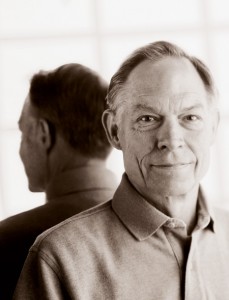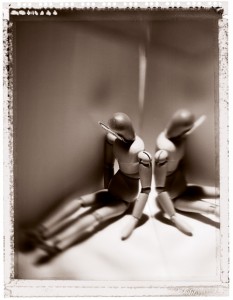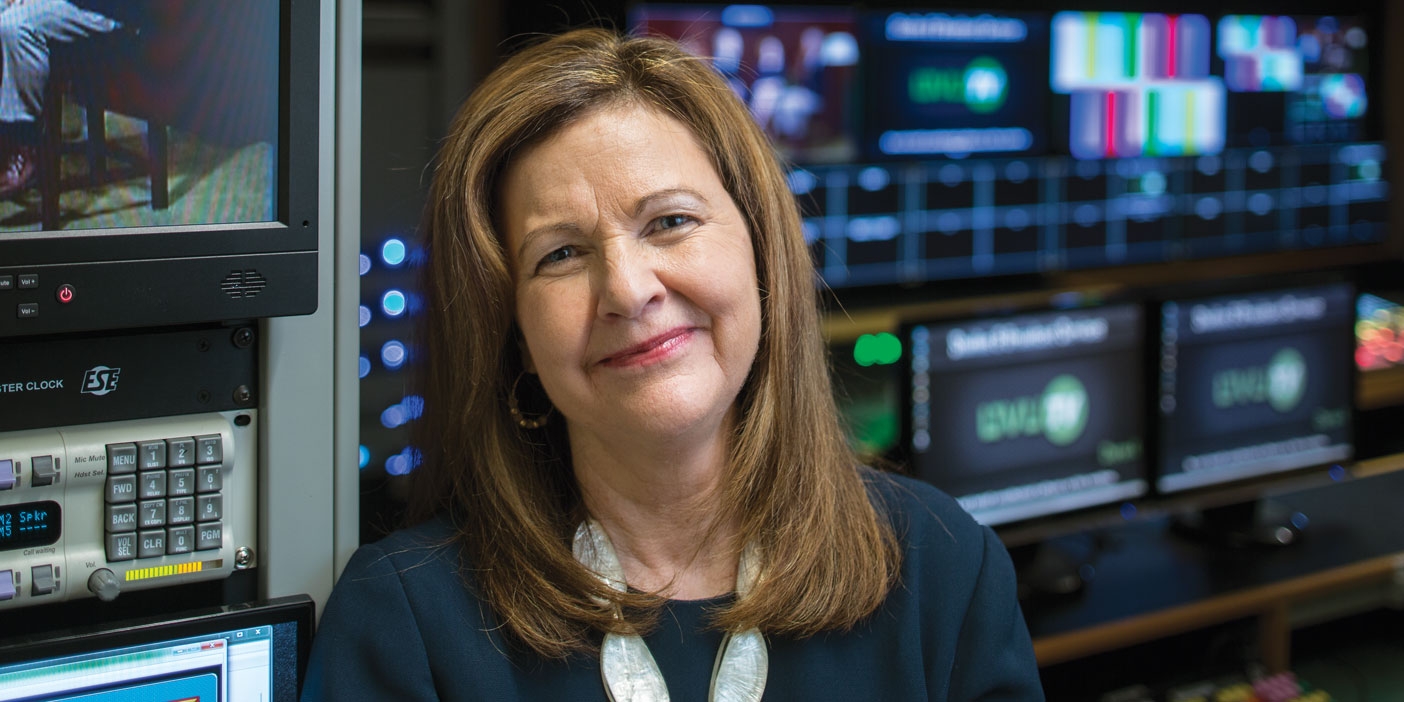By M. Sue Bergin, ‘79

Those who know and love philosophy professor C. Terry Warner, ’63, describe him in terms that consistently evoke paradox: brilliant but unassuming, intense but accessible, energetic but relaxed, deeply spiritual yet savvy to the world. But their musings tend to turn away from him and toward the effect he has had on their own lives. And that is just as he would have it.
Warner passionately believes that one cannot truly influence anyone by trying to influence. One can only be. If that way of being includes relentless honesty with oneself and behavior consonant with truth, then and only then is influence possible.
“After any period of time with him, you want to be better in the next moment than you were in the past moment,” says BYU colleague Terrance D. Olson, ’67, professor of marriage, family, and human development. “He turned me to the Savior as directly as anything else except the example of the Savior himself and the scriptures. How he does that is by not being strategic, not being manipulative, not trying to figure out how to be of influence, but rather by simply living truthfully.”
Olson chooses his words carefully, knowing that Warner studiously avoids self-promotion or cultivating a following. Articles such as this one worry Warner.
Wary of the limelight, he has avoided becoming the famous self-help guru he might have become, but through his teaching and his revolutionary ideas about human behavior, he has—paradoxically and perhaps inevitably—quietly helped tens of thousands of people become truer to themselves and to others.
“By far my greatest of all pleasures in life comes in seeing other people living faithfully to God and helping people attain this happy condition,” says Warner. “I say ‘helping,’ but I don’t believe that’s what happens. People are helped by turning to the Source of help. I love to assist this process because I get to see God’s hand at work.”

At 65 Warner is contemplating retirement and is trying to slow his professional pace to spend more time with his wife, Susan Lillywhite Warner, ’61 (they hope to go on a mission together), and their 10 children and 16 grandchildren. He might even resume painting or go to a movie one day soon—favorite pastimes that have been edged out for years as he’s juggled heavy administrative and teaching responsibilities at BYU, a large family, extensive Church assignments, and research work.
AWAKENING
The parts of Warner’s personality that seem to have the most positive influence are, by his own account, those areas on which he has had to work the hardest. “In my earlier years I would sometimes be so wrapped up in my thoughts that I must have seemed nonresponsive. A couple of years after we came to Provo, my wife Susan reported a person saying, ‘Terry looks right through me, like I’m not even there.’ It was a shock. I thought, I have to wake up to other people and make sure they know it.”
Though Warner was never the stereotypical ivory-tower intellectual who stands aloof from ordinary people, whatever detached aura he might have once communicated is long gone.
“When I first met Terry about 12 years ago, I was taken aback because he is just so unassuming and so warm,” says Jim Murphy, a former executive with U.S. West and now owner of his own consulting company. “He is probably the most authentic individual I’ve ever met, and I don’t use that word lightly.”
But Warner believes he’s had to struggle to emulate what he saw in the saintly souls around him as a child—a mother “who never did anythingwrong in her life” and a father who was “a model of perfect integrity.” His quest to develop their natural humility and purity of heart became inextricably bound with his philosophical work.
The culmination of Warner’s efforts to meld spiritual and philosophical matters was published last fall, some 30 years after he began his quest and nearly 20 since he drafted the first pieces of a seminal manuscript. Bonds That Make Us Free: Healing Our Relationships, Coming to Ourselves (Salt Lake City: Shadow Mountain, 2001; 336 pp.; $19.95) explains to a non-academic audience Warner’s ideas about what he calls self-betrayal—violation of one’s own sense of right or wrong, which one cannot do without blaming others and creating all manner of inner and interpersonal trouble. The book contains powerful stories Warner has collected from people who have awakened to honest self-understanding, allowed their hearts to change, and found peace within themselves and with others.
The seeds of the book were sown in Warner’s childhood near San Francisco. When he was 9 or 10, he remembers being “awestruck” when he discovered that other people had inner lives like his. “My mother was real to me—I could feel her feelings. But I began to realize that others were not so real to me. I knew that opening myself up to them in love was to be one of my life tasks.”
Part of his struggles lay in the emotional fallout of being teased mercilessly for stuttering. He developed a certain compensatory bravado, which he says he knew intuitively was offensive to God. But he could not readily see how to conquer it. His quest for understanding and healing would, years later, drive his philosophical career. “In many ways, Bonds and related writings are an outgrowth of long years of self-searching and prayer.”
After high school he studied drawing and painting at the Art Students League and acting at the famous Stella Adler Studio, both in New York City. But it was ideas that thrilled him, and both painting and acting would soon be supplanted by philosophy. First, however, Warner served a two-year mission in Great Britain, then completed a history degree at BYU, where he met and married Susan Lillywhite. In 1963 they headed to Yale, where Warner earned a master’s and doctorate in philosophy under a Danforth Graduate Fellowship. In 1967 the Warners, now a family of five, moved to Provo where Terry joined the BYU faculty. Within a year he was named chair of the Philosophy Department. Two years later he became director of the Honors Program. By 1972 he was dean of the College of General Studies, one of the university’s youngest deans ever.
These early administrative assignments plus a heavy teaching load tilted him away from the life of research and publication he had anticipated for himself. “That’s just fine,” he says. “This university has been built upon thousands of happily broken professional plans, going back to Karl G. Maeser. Perhaps that’s our secret strength.”
QUESTIONS AND ANSWERS
In 1972 Arthur Henry King, the renowned teacher, scholar, philosopher, and poet (now deceased) joined the BYU faculty, and the two met regularly and taught an honors seminar together. Warner looked to him as a mentor. “We were talking one day about understanding speech, and the question arose—does the speaker have a more correct understanding of what he or she is saying than anybody else? And I knew the answer was no. We don’t necessarily understand ourselves better than other people understand us. And why would that be? I sensed that self-deception about any matter would include deception about many things. Even a small personal dishonesty would destroy our self-transparency and plunge us into a false and fallen way of being.”
That evening Warner went home, lay down on the carpet, and filled 25 single-spaced pages with ideas about how to further cast his questions and frame preliminary answers.
“All my intuitions were going and my hand couldn’t keep up. When I was done, I knew my task—to unravel and make coherent those 25 pages.” What he didn’t know is that doing so would occupy much of the next 30 years. “I just couldn’t leave it alone; that’s all there is to it. In every spare moment I would be thinking about it.”
Warner found himself preoccupied with questions about simplicity in behavior—sincerity and straightforwardness—as opposed to the complexity of self-insistence and social-impression management. “How is it possible for us to deceive ourselves, to mislead ourselves about our real intentions? Why do we find ourselves doing things that then we don’t approve of? Why do we alienate others, including those we love?”
For years Warner arose at 4 a.m. to work on his ideas so that his family life and teaching responsibilities would not be disrupted. He went to his BYU office or his office at home or to an unoccupied bed with a tape recorder or pad. “I think that was 90 percent of the research I ever did—to try to analyze my observations and reflect on my life experiences.” These were spiritual times.

“Doing this philosophical work and trying to be a prayerful, spiritual person and commune with God were intertwined,” he says.
Warner is quick to emphasize that he did not work on the ideas alone. A band of colleagues that came to be known informally as “the moral studies group” met weekly for several years to explore the questions and possible answers. They included Arthur King, James W. Robertson, ’73, W. Duane Boyce, ’74, Terry Olson, Dennis J. Packard, Richard N. Williams, ’74, and Glen M. Cooper, ’88.
“There was such a communal spirit—no defensiveness, no taking a stand, no arguing, just shared discovery. Looking back, I consider those years among the sweetest of my professional life.”
Yet clarity came slowly, and at one point the group decided the reason might be that they themselves were self-deceived in their own lives, so that they made wrong assumptions about how human beings operate. Perhaps they were victims of the very illness they were trying to diagnose, they reflected, and the illness itself was keeping them from understanding it correctly. “And so we began to make an effort to live better so that we could understand better,” says Warner. “It was a long, long quest.”
But the answers did finally begin to flow, and in 1978 a group of psychologists asked him to present his theoretical work. He did, and the reaction was enthusiastic. Two-thirds of the group later told him the experience changed their lives. That convinced him to try using his discoveries to help people solve their emotional and relationship problems, just by teaching them his material.
By the mid 1980s, Warner had burnished his ideas into a widely circulated manuscript titled “Bonds of Anguish, Bonds of Love.” For years it sold at cost in copy centers, through counselors and therapists, as text material for classes and study groups, and in connection with organizational training programs. Eventually it reached the hands of tens of thousands of people. But the manuscript contained only about half of what Warner originally intended to include, and it would be years before he would rewrite his ideas for publication.
Shortly after his work with the psychologists’ group, Warner founded the Arbinger Institute (see “The Arbinger,” p. 26), which teaches his ideas in a variety of ways to families, organizations, and individuals.
In the mid-1980s, he worked with the renowned philosopher and psychologist Rom Harré at Oxford University, where he was elected to a visiting position in Linacre College. There he continued developing his ideas, giving lectures in the United Kingdom and Europe and publishing professional papers.
But getting the “Bonds of Anguish, Bonds of Love” manuscript into book form still awaited. Warner’s tight schedule was part of the delay, but also he had concerns about publishing to a general audience.
“I felt it might be assumed that I was trying to tell others how they should live their lives, and that wasn’t true,” says Warner. “I also had this instinct that I had to grow more before I could complete the book. The subject area is holy ground—our deep, sacred relationships with each other and with God.”

In late 2001, within nine months of committing to a publisher, the manuscript finally became a book.
“He has such fabulous material,” says editor Emily Watts. “I think it’s life-changing stuff. It gets you right in the core. He has such a sense of commitment to it and feeling for it—the importance of helping people see how they could be happier.”
GUIDING STUDENTS TO DISCOVERY
Warner’s new book and his consulting work could easily overshadow the fact that all his theoretical efforts and consulting experiences have funneled back into his first love—teaching. He is famous for preparing lectures assiduously, drawing ideas out of even the most reticent students, and spending countless hours helping students individually.
“I don’t believe in the ‘fount of knowledge’ view of the teacher,” he says. “If I have any talent for teaching, it may lie in my keen sense of where the students are in their understanding and what they need to hear or experience or do in order to take the next step in understanding on their own.”
Warner reveres his students, and that respect seems to help them absorb knowledge and come up with their own insights. A. Scott Loveless, ’75, executive director of the World Family Policy Center at BYU‘s J. Reuben Clark Law School, took Warner’s Book of Mormon class in the 1970s.
“What struck me about him was his intellectual capacity coupled with his absolute faith in the scriptures,” says Loveless. “He could see things in the Book of Mormon and talk about it in a way that brought it off the page. He had great insights, and he used them to whet students’ appetites and to encourage them to make their own discoveries.”
Courtney M. Glenn, ’00, a graduate student in instructional psychology and technology, has taken several classes from Warner. Her first exposure was somewhat jarring. “If someone’s comments were off or it seemed like they were struggling to understand, he’d just stop them and say, ‘No that’s not right. Try again.’ At first it was surprising, but it was done in such a loving way that you never felt he was demeaning or not letting you speak. Rather you felt him humbly guiding you through rigorous material that he had struggled with as well. You felt supported and loved, sensing that he knew how to help you change. He has been one of my greatest mentors.”
Warner’s love for his students extends to the university itself. His current consuming project reflects that affection. He’s coordinating the development of a gallery in a dramatically designed setting of the new Joseph F. Smith Building, soon to replace the Joseph F. Smith Family Living Center. The permanent exhibit will use multimedia and interactive technology to tell the story of education in Zion.
“We’ve done a remarkable job in the Church of preserving and disseminating the stories of the people who’ve gone before,” Warner says. “We need to do a parallel thing for BYU so that all of us—faculty, staff, students, visitors—can better understand and build upon our magnificent tradition.”
This project might be the last major enterprise Warner undertakes for BYU, and he is as ardent about it as if it were his first. Unless we understand our mission, he says, we’re in constant danger of trying to mimic secular institutions.
“We have spiritual resources they know not of and a mission they do not share—to prepare the next generations to create holy homes and do the work of the world in righteousness.”
M. Sue Bergin is a writer and editor living in American Fork, Utah
“Honest, Simple, Solid, True,” a devotional address given by C. Terry Warner in 1996 and can be read online here.
THE ARBRINGER
By M. Sue Bergin, ’79
BYU philosophy professor C. Terry Warner, ’63, never set out to be an organizational consultant, but in the late 1970s Stephen R. Covey, ’76, knew about his work on self-betrayal and thought the concepts might help one of his clients. Using Warner’s ideas, the company went from being nearly torn apart by internal conflict to becoming the most profitable company in the steel service industry.
In this experience Warner discovered that working with organizations could provide him with a laboratory of living subjects that anchored his theoretical work to practical realities and motivated thousands of people to share stories with him. He also found that the people he taught to work more productively together used what they learned to improve their families.
“That was the most thrilling part,” says Warner, “because I had always felt that above all I was to use what I was discovering to help families.”
At a crucial point, Warner was counseled by the BYU administration to develop and gain legitimacy for his ideas off campus as practical tools for helping people. In 1992 he let his occasional consulting practice expand into a small company, the Arbinger Institute, and three key employees were made partners in the mid 1990s.Arbinger is an old French (and he says more pleasing) spelling of the word harbinger, which means a messenger or forerunner—something that brings news of what’s to come.
“We wanted constantly to remind ourselves that what we teach is not the path all of us must follow to become whole; it’s, at most, one of many paths to the path.” The institute, located in Woods Cross, Utah, provides organizational consulting and training services (often at cost or low cost for nonprofit groups) and seminars for the general public.
On three occasions Warner has taken a one-year leave of absence from BYU or had his time purchased to work full-time on Arbinger projects. Otherwise he has averaged only a day or two a year on Arbinger concerns. His partners, whom he calls “princely men of great ability,” have developed and run the institute. He didn’t even read the institute’s best-selling book, Leadership and Self-Deception, until it was published, though it is based on his work. “I have more confidence in their work than in my own,” he says.
Some of his most satisfying work with organizations is an alliance that developed between Arbinger and the Anasazi Foundation, a program for troubled youth. While the teens in the program are building their confidence, their parents get the Arbinger relationship training.
“This man has a good heart and is without guile,” says Ezekiel C. Sanchez, ’73, chairman and co-founder of the nonprofit Anasazi Foundation. “We found out the Arbinger principles are the same we teach the youth, and Terry figured out how to apply them to teach the parents. Without taking a penny for himself, Terry taught us how to use the Arbinger principles in our organization and how to teach them ourselves.”
In fact, Warner has worked as a voluntary advisor and donor to Anasazi (at one point pledging his life savings to rescue it) and has helped raise funding from others. In 2000, for example, Boston-based Bain Capital donated $50,000 to Anasazi in Warner’s behalf. Bain managing director Robert C. Gay, ’74, announced the donation at a banquet honoring Warner with Anasazi’s Turn for Peace award, saying the donation was made because Warner “had such a deep impression upon our partners at our firm.”
One of the most powerful tools Arbinger uses in its seminars, and Warner uses in his book, Bonds That Make Us Free, is to share stories about people who have recognized self-betrayal in their own lives and changed their hearts. When others identify with a story told with honesty, they realize that the core of the story is their own, only with different details. That realization is itself an honest act. By it, they too see their lives in an honest way and start to escape their own self-deception.
“These are not just any old inspiring stories,” he says. “They’re stories about people coming to acknowledge truth about themselves or others; they’re stories about yielding to the truth.”
THE PHILOSOPHY AND ITS IMPACT
By M. Sue Bergin, ’79
For philosophy professor C. Terry Warner, ’63, the heart of the message of his book, Bonds That Make Us Free, is about Jesus Christ, though the book states the ideas in nonreligious terms. For the BYU Magazine audience, he sums up the book’s message this way:
“When we do what we feel is wrong, we can’t help experiencing the world in a negative way. We convince ourselves that others are making it hard for us to treat them right, when the truth is that the fault is our own. This makes us so insecure that the world becomes a threatening place. We grow anxious and self-concerned and think the solution to our problems is to fix or avoid the people with whom we’re finding fault. And needless to say, they usually find fault with us in return. The process damages our relationships and destroys our peace.
“But, mercifully, the truth that will guide us aright is always available. It comes to us through the Spirit of Christ, the faces of others, the innocence of children, and the beauty and bountifulness of nature. All these things call upon us to treat them generously and reverently. And when we yield ourselves to that call, when we live truthfully, we see things as they really are.
“Having ended our self-betrayal, we no longer have any reason to take offense, to find fault, and to worry about ourselves. Our heart has softened so that we can resonate with others’ burdens and joys.”
Believers typically say that by studying Warner’s ideas, they discover ways they hadn’t before imagined in which the gospel provides solutions for painful problems within themselves and with others. “Terry’s work shows the absolute psychological and emotional necessity of constantly living for, listening to, and following the Spirit,” says Craig Horton, a southern California psychotherapist and an area coordinator for the Church Educational System.
Equally, Warner’s work centers around the importance of a change of heart, says W. Duane Boyce, ’74. “When I undergo a change of heart, I become alive and responsive toward other people. I see other people to be just as real as I am. One way to describe Terry’s breakthrough is to say that he discovered that self-deception is not a matter of cognition—we don’t deceive ourselves by something we tell ourselves; self-deception is not telling little lies to ourselves. It’s to be in a false way of being. And we can be drawn out of that false way of being by allegiance to the spirit of truth.”‘
DEDICATED TO FAMILY
By M. Sue Bergin, ’79
Bonds That Make Us Free by philosophy professor C. Terry Warner, ’63, is dedicated to Warner’s wife, Susan Lillywhite Warner, ’61, “my soul mate here and hereafter.” If he has changed for the better, he says, it is because of her.
The Warners have given extensive Church service over the years. Terry was bishop while in graduate school and has served in the same capacity twice in Provo. He has also worked six times on Church general boards or committees. Susan’s latest in a line of demanding assignments was her calling in the Primary general presidency from 1994 through 1999. “We love to support one another,” he says.
He believes their children have been equally influential on him: “I can honestly say I have felt that every single one of my children is my superior in profound ways. It’s been a privilege to grow along with them.”
The Warner children speak of their father with deep affection and admiration. His approach to helping them through struggles has been especially bonding, says the eldest, David T. Warner, ’93, director of music and performing arts for The Church of Jesus Christ of Latter-day Saints.
“It’s not a matter of him informing us. It’s a matter of him being with us in our search. It doesn’t feel like he is telling his kids what to do. He takes our struggle so seriously and is willing to bear it with us, and then he takes our hand and together we turn to the Lord. When you finish seeking his counsel, he thanks you for giving him the opportunity to learn with you.”
For Alice Warner Johnson, ’89, the second oldest, a homemaker and a former executive director of the Arbinger Institute, a tender memory is feeling as a teenager that her father genuinely liked her.
“I went through a period of feeling terribly insecure. I thought I was ugly, I thought I was fat, I thought I would never date or marry,” says Johnson. “I articulated those feelings, and yet I wasn’t very weighed down by them because I always knew my dad really, really liked me—not loved me just because I was his daughter, but liked me as well. He liked to talk to me and be with me. Just that one element—this guy who thought I was so great—meant everything.”
With 10 children, serious challenges along the way were inescapable. When one son faced particularly difficult struggles, Warner canceled all his travel for that year and everything else that was not absolutely necessary. “All he did was just tag his son. He didn’t preach to him or lecture him—he just went to find him, day or night, wherever he went,” recalls friend and colleague Paul Smith.
Jim Murphy, a former client from Warner’s consulting days, saw first-hand Warner’s commitment to his family as the two traveled together extensively over a period of several years. “You can’t be with Warner without being with one or the other of the whole darned family—Susan and the kids and then the spouses and all their kids. Every year I get the famous Christmas picture, and I just laugh. I think this year they’re going to have to use the wide lens.”









